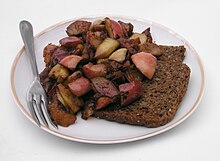Æbleflæsk

Æbleflæsk (Danish pronunciation: [ˈɛːb̥ləˌflɛsɡ̊], apple pork) is an old Danish dish consisting of cured or salted pork fried with apples, and often onions, thyme and sugar.
There are many versions ranging from a sweet apple mash with small cubes of bacon, to larger slices of lightly salted and fried pork arranged with the fried apples and onions on a dish.
Æbleflæsk is often served with beer and snaps.[1] It is a common dish for pre-Christmas buffets (julefrokost). It is not clear where the dish originated. It is beloved in some regions, such as Funen, and less common in certain other parts of the country.
In a version common today, bacon is first fried, followed by tart apple pieces, which should soften up before they are taken out of the pan (they can alternatively be cooked in water instead[1]). While the apples are frying, they are mixed with sugar. Afterwards, the bacon and the apple pieces are mixed and served either cold or warm on rugbrød.[1][2][3][4][5] It may also be prepared in the oven.
See also
References
- ^ a b c "Æbleflæsk". Pathways to Cultural Landscapes (European Union). Retrieved 2009-12-05.
- ^ Erik Koed, Westergaard (1974). Danske Egnsretter (in Danish). Lindhardt og Ringhof. pp. 63–64. ISBN 87-7560-152-4.
- ^ Boyhus, Else-Marie; Fakstorp, Jørgen (1998). Gastronomisk Leksikon (in Danish). Nordisk Forlag. ISBN 87-00-20284-3.
- ^ Vejlgaard, Morten (2008). Eleverne (in Danish). Books on Demand. ISBN 978-87-7691-236-9.
- ^ "Gammeldaws æbleflæsk" (in Danish). Maduniverset. Retrieved 2009-12-05.
